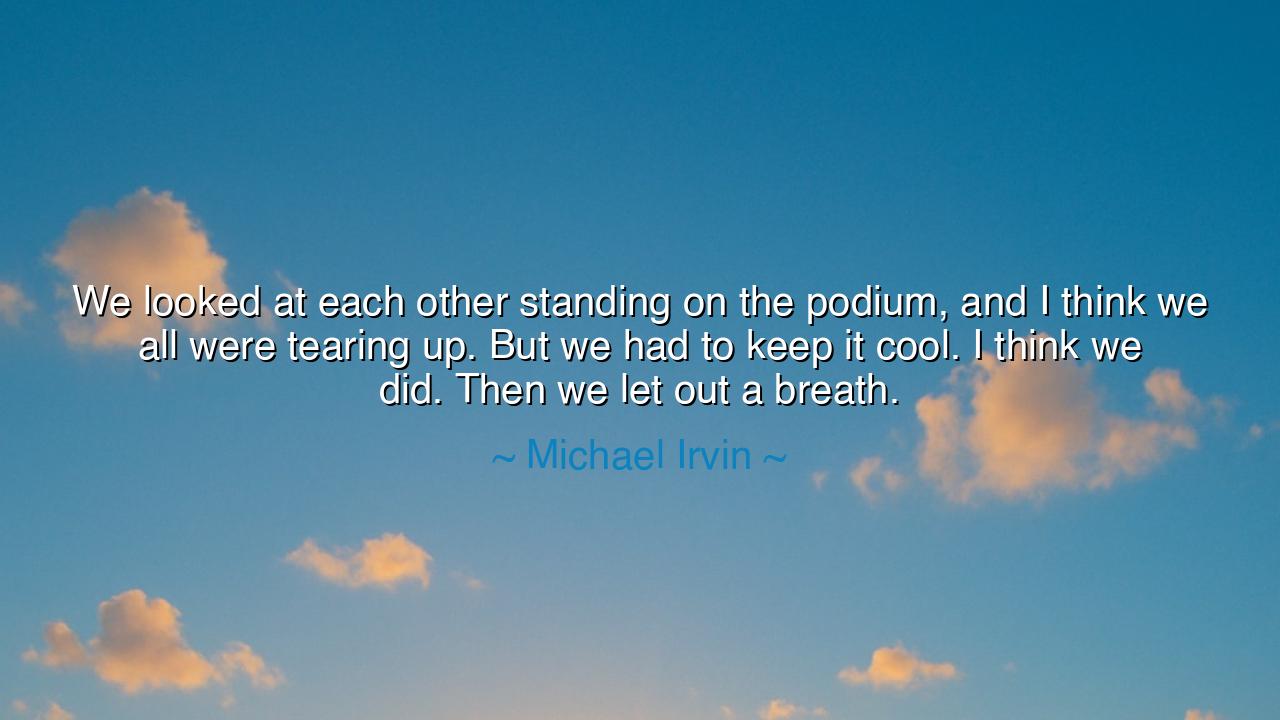
We looked at each other standing on the podium, and I think we
We looked at each other standing on the podium, and I think we all were tearing up. But we had to keep it cool. I think we did. Then we let out a breath.






In the ancient teachings of the warrior and the hero, there are moments when the soul is tested—when the heart swells with emotion and the eyes well with tears. Yet, these same souls know that true strength is not found in the shedding of tears, but in the discipline to keep one’s composure in the face of overwhelming emotion. Michael Irvin’s words, “We looked at each other standing on the podium, and I think we all were tearing up. But we had to keep it cool. I think we did. Then we let out a breath,” capture the essence of this struggle—the internal battle between the vulnerability of emotion and the composure required to stand tall in the face of triumph.
The ancients often spoke of the balance between emotion and reason, between the human heart and the stoic mind. The Greek philosophers, particularly Aristotle, understood that while emotion is a natural part of being human, it must be tempered with self-control. In their teachings, virtue was not the absence of emotion, but the ability to master it, to allow it to guide us without letting it overwhelm us. Michael Irvin’s experience, standing on that podium, mirrors this ancient truth. His tears, though a natural expression of the overwhelming joy and pride of the moment, were tempered by the awareness that in that moment, restraint was necessary. The breath he took after symbolizes the wisdom of knowing when to allow emotion to flow, and when to maintain control.
Consider the story of Hannibal Barca, the Carthaginian general who led his army across the Alps to confront the mighty Roman Empire. There were moments in his journey when Hannibal’s soldiers would have been overcome with despair, exhaustion, and grief. Yet, in his leadership, Hannibal demonstrated the art of discipline, knowing when to allow for the natural release of emotion and when to command his men to remain focused on the greater mission. In moments of victory, when the battle was won, there were undoubtedly tears of relief and joy, but Hannibal understood that stoic resolve was required to face the challenges ahead. Emotion, while powerful, must be channeled toward action and purpose, not indulgence.
In modern times, athletes like Irvin are no strangers to the internal struggle between emotion and composure. When standing on a podium, as Irvin described, there is a flood of memories, challenges, and sacrifices that rush to the surface. Victory is not just a moment of triumph, but a culmination of years of struggle. The breath taken after the podium moment is not merely physical—it is a release, a recognition that all the effort, the hardship, the unseen battles, have led to this singular moment of glory. But even in this moment of triumph, there is humility, for the athlete knows that to stay on top, to continue to excel, requires the same discipline and focus that brought them here.
The lesson of Michael Irvin’s words is a lesson for all: mastery over emotion does not mean its suppression, but its proper expression at the right moment. In our own lives, we are faced with challenges and triumphs that stir the heart. But the true test lies in how we respond. In the face of joy or sorrow, we must learn to breathe, to acknowledge the power of our emotions, but to act with clarity and purpose in the face of them. The breath Irvin took after that emotional moment was a return to the present, a grounding of the soul, a reminder that the journey is far from over.
The ancient warrior knew the power of the pause—the moment between the rush of emotion and the return to composure. In battle, warriors were taught not to let anger cloud their judgment, nor to let fear overwhelm their strength. Control was the key to success—and it was through this self-mastery that they were able to achieve greatness. Michael Irvin’s reflection on his moment of triumph serves as a reminder that in the heat of the moment, whether in victory or defeat, the true strength lies in how we control our emotions and use them to fuel the next step in our journey.
In the end, the lesson from Irvin’s words is not just about holding back tears, but about understanding that emotions are part of the human experience, and yet, they do not define us. We define ourselves by our actions, by how we rise in the face of adversity, and by how we conduct ourselves in moments of both triumph and defeat. So, when faced with a podium moment, when faced with life’s challenges, take that breath—let it be both a release and a reminder that composure and determination are the true marks of greatness.






AAdministratorAdministrator
Welcome, honored guests. Please leave a comment, we will respond soon